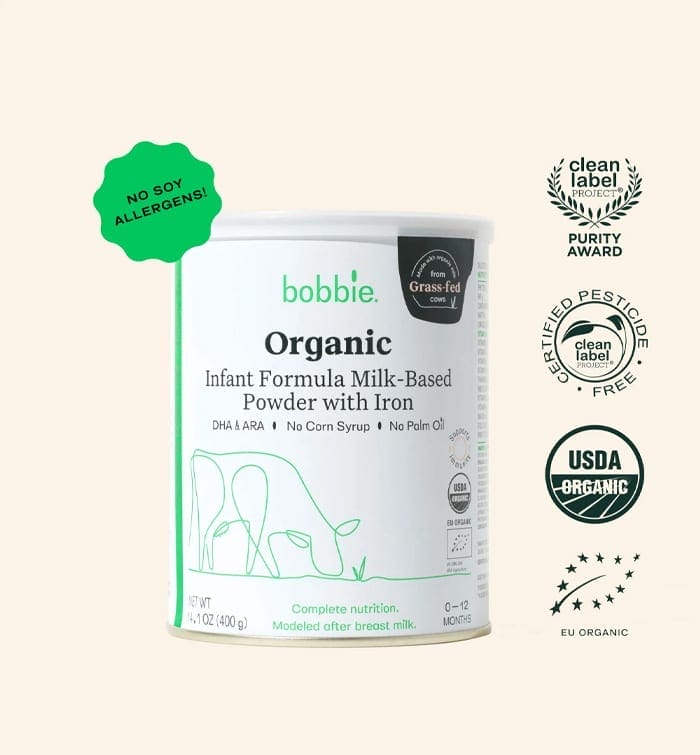We are proud to say that these posts are not sponsored. Our editorial team of Bobbie moms and writers personally select each featured product. If you buy something through our links, we may earn an affiliate commission, at no cost to you.
You’ve got your hospital bag packed, the nursery decorated, and family members on standby. All systems are “go” and ready to welcome your new baby into your life.
There’s just one thing you’re still unsure of: what will a newborn formula feeding schedule actually look like? You’ve read the books, talked to friends, and have an idea of how you’d like to handle formula feeding, but you aren’t quite sure you’ve got it right. After all, if you haven’t had a baby before, or haven’t formula fed one, this is a whole new ball game.
We understand. Everything related to your baby is new, exciting, a bit intimidating, and sometimes downright confusing. Take a scroll through Amazon’s baby products and you’ll practically have a panic attack. There’s a device, a nipple, or a specialized bottle for practically everything you can possibly imagine related to feeding, not to mention about a million different types of baby formula!
With all of the products on the market, things look much more complicated than they need to be.
What you do need is an idea about a feeding schedule. You need to know what to expect from the first day your baby arrives, through their first year of life, and beyond. We spoke with Lauren Crosby, MD, FAAP, and Bobbie medical advisor to find out what a formula feeding schedule can look like.
What to expect when your baby comes home
Once your baby arrives, feeding is one of his (and your) top priorities. Feeding, sleeping, and soiling diapers are the most important parts of his little routine, and your job is to make sure he’s getting the correct amount of formula he needs, when he needs it.
Every baby is different, so every feeding routine will be slightly different. You’ll eventually settle into a pattern that works for your baby, and then his routine and feeding needs will change again! You’ll adopt a new pattern, and then another change will happen. This is all normal, and your ability to remain flexible will be the key to successful and happy feeding.
Dr Crosby shared general guidelines and tips for your baby’s formula feeding schedule, starting with the first few days of life through a year of age and beyond.
How much will my newborn eat?
Right after your baby arrives, one of the most important things you can do is feed on demand. Whether you deliver in a hospital, birthing center, or at home, your baby’s feeding needs will likely require a feeding approximately every two to three hours, but this can vary greatly in the first few days of your baby’s life.

Shop Bobbie Organic Infant Formula
Bobbie Organic Infant Formula is a USDA Organic, EU-style infant formula that meets all FDA requirements. It is a complete nutrition milk-based powder modeled after breast milk and is easy on tummies. It is non-GMO and doesn't have corn syrup, palm oil, or maltodextrin. Learn more about Bobbie.
Here are some cues you can look for to determine if your baby is hungry:
- Lip smacking, opening and closing mouth
- Rooting — this involves your baby turning his head inward in the direction where he usually finds his bottle
- Increased alertness and activity
- Sucking on hands and fingers
- Crying
These are all signs it’s time to give your baby a bottle. If you attempt to give your baby a bottle and he seems disinterested or fussy, discontinue and try again later.
It’s important to note that if you deliver in a hospital, you likely won’t be able to bring your own formula or feeding supplies to use there. Infant formula is treated as medication in a hospital setting, so the hospital will provide formula for you. Speak with your hospital in advance about what types of formula will be offered and if you have an opportunity to work on a custom plan with them.
How much will my baby eat?
Once you get home and get settled into a routine, you can expect your baby to take around 2.5 ounces of formula per pound of body weight per 24 hours. Wake the baby to feed at least every 3 hours until the first visit with your pediatrician. Some babies are very sleepy after birth and need a nudge to get them eating and keep them hydrated.
The first months of your baby’s life are pretty chaotic. Once you think you’ve settled into a nice little routine, your baby’s needs change and you have to readjust and find a new routine. This is all completely normal.
How much will my baby eat at 2 to 4 months?
By the end of your baby’s first month of life he will need approximately four ounces of formula per feeding, and will likely take a bottle just every three to four hours. If your baby takes more or less, that can be completely normal, your main concern should be that he is gaining weight appropriately. Babies who are 2-4 months old take 4-6 oz every 3-4 hours.
How much will my baby eat at 4 to 6 Months?
“Babies should be introduced to solids between 4-6 months, however, during these first few months, babies are mostly exploring new flavors and textures, most of their nutrition will still come from breastmilk or formula,” Dr Crosby agrees.
The goal with the introduction to solid food is to expose your baby to a vast array of foods and help him build a palate of varied tastes.
During this period, your baby will still need up to 32 ounces of formula per 24 hours. An average bottle feeding will be between 6-8 ounces. Solid food in the form of cereals, meats, fruits, and veggies will consist of a few tablespoons full once or twice a day.
“Lots of things change with the introduction of solid foods, including poop!” shares Dr Crosby. “Expect lots of poop changes; color, consistency, and frequency all change with the introduction of solids. Poop can be yellow, brown, green, orange, or even red due to some foods like beets or medications or food dyes,”
How much will my baby eat at 6 to 8 Months?
Beyond six months of age, your baby will likely eat more solid foods, but formula will still play a rule in his overall nutrition. In fact, your baby will still take approximately 24-32 ounces of formula in 3-5 bottles per day. Each bottle will likely be 7-8 ounces.
Solid food during this period will consist of 4-9 tablespoons of cereal, fruits, veggies, and 1-4 tablespoons of meat or plant-based protein per day.
Dr Crosby advises, “Remember to start having family meals when the baby starts eating food. This teaches good eating habits and can have a positive effect on development, too.”
How much will my baby eat at 9 to 12 Months?
Your baby’s formula needs are gradually beginning to decrease, but only just slightly. Your baby will still need 24-30 ounces of formula in 3-4 bottles of 7-8 ounces per day.
Solids, at this point, usually increase. You can expect your baby to eat ¼ to ½ cup of grains, fruits, veggies twice daily, and ¼ to ½ cup of protein-rich foods (meat or plant based) and dairy foods per day.
Your baby is well on his way to getting his nutritional needs met with solid foods so you won’t need to give him any formula after one year of age unless directed to do so by his primary care provider.
Does routine matter with baby feedings?
Yes, routine does matter. According to Dr Crosby, “Keeping the baby on a schedule is beneficial to make sure they fit in the proper amount of nutrition and naps that the baby needs to grow and thrive. It also helps parents too so they can plan their day and juggle all of their other responsibilities. It is important to be flexible though because if you travel, if the baby is sick or you just have a day you cannot stick to the schedule, that is OK. Just get back on track when you can.”
Will my baby have growth spurts?
Expect for your baby to go through periods of rapid growth, or “spurts,” around weeks one and three, and another between weeks six and eight. More growth spurts occur around 3 months, 6 months, and 9 months.
During these times, your baby will want to eat more and possibly more frequently. Be flexible with your schedule and if your baby seems hungry, feed him.
Do I need to wake my baby for feedings?
No, says Dr Crosby, “As long as you have confirmation from your pediatrician that your baby is doing fine and does not have to be awakened for night feeds.” She continues, “I do advise parents not to let their baby sleep 4-5 hours straight during the day because then the baby will likely be more awake at night and want to feed more often at night.
How often should I feed my baby?
In general, full-term, healthy babies regulate themselves quite well and wake up when they need feeding.
Because babies self-regulate so well (i.e. eat when they are hungry and stop when they are full), it is okay to feed your baby on-demand. Unless your baby is not growing normally (gaining too much or too little weight) there’s usually no reason to be concerned if your baby occasionally eats more or less than usual.
If you are concerned you will overfeed your baby, you generally shouldn’t be. While some recent studies have suggested that it is easier to overfeed a bottle-fed baby because some babies enjoy sucking and will continue to suck on the bottle even when they’re done eating, you can avoid this by only preparing as much formula as your baby needs and not providing extra ounces.
How to know if your baby is hungry
As previously mentioned there are some classic signs you can look for to determine if your baby is hungry or not. Lip smacking, rooting (turning towards breast or bottle position), sucking on hands and fingers, and crying are all signs it’s time to eat.
How to know if your baby is full
A baby who is full or does not want a bottle will turn his head away when he is finished, push the bottle away, or spit it out of his mouth.
If your baby doesn’t seem hungry at his “normal” bottle time, don’t worry too much about it; wait an hour and try again later. If he misses more than one or two feedings, discuss it with his primary care provider to make sure he’s on track with weight and development.
Conclusion
Your baby doesn’t have to be placed on a strict feeding schedule. You can introduce a schedule that works best for you and your child. Speak to your pediatrician any time you have concerns about your baby’s feeding schedule.
Just remember that the key to successful feeding from birth and beyond is flexibility.

Shop Bobbie Organic Infant Formula
Bobbie Organic Infant Formula is a USDA Organic, EU-style infant formula that meets all FDA requirements. It is a complete nutrition milk-based powder modeled after breast milk and is easy on tummies. It is non-GMO and doesn't have corn syrup, palm oil, or maltodextrin. Learn more about Bobbie.
Sources:
Amount and Schedule of Formula Feedings | Healthy Children

